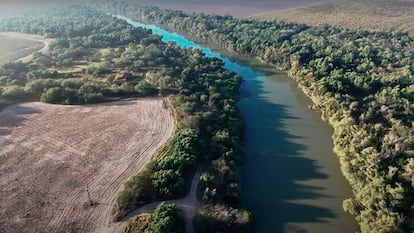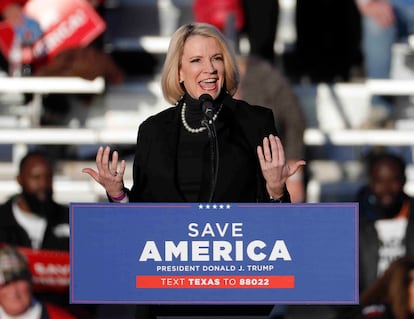Texas volunteers as a base of operations for Trump’s mass deportations
The state’s land commissioner offers the president-elect a 1,400-acre ranch along the border to build new temporary detention centers to expel ‘violent criminals’
Texas is emerging as a key ally in Donald Trump’s mission to conduct mass deportations. In a letter, the state’s land commissioner, Dawn Buckingham, offered the president-elect a huge ranch on the border to serve as a base of operations for the plan to expel millions of undocumented immigrants, which he intends to implement as soon as he takes office. According to a letter sent on Tuesday, the 1,400-acre tract of land along the Rio Grande in Starr County could easily house new temporary detention centers and function as a launching pad.
“My office is fully prepared to enter into an agreement with the Department of Homeland Security, Immigration and Customs Enforcement, or the U.S. Border Patrol, to allow a facility to be built for the processing, detention, and coordination of the largest deportation of violent criminals in the nation’s history,” said the letter signed by Buckingham. The ranch in question, located in a high-traffic area near the town of La Grulla, about 30 miles west of McAllen, was purchased by the State of Texas in late October. Less than 24 hours later, construction of a section of the state’s border wall was approved to begin. According to the letter, the previous owner had not approved construction on her property and had even refused access to law enforcement.
In an interview with Fox News, Buckingham said she was “100% on board with the Trump administration’s pledge to get these criminals out of our country” and that the offer had come after brainstorming with her team. “We thought, hey, the Trump administration probably needs some deportation facilities because we have a lot of these violent criminals that we need to round up and get out of our country,” she said, adding that the land is mostly flat, making it easy to build on, as well as accessible to international airports and close to the Rio Grande. “We’re happy to make the offer and we hope they take us up on it.”

The ranch, which is a little more than one and a half times the size of Central Park in Manhattan, is currently being used for agriculture and produces onions, grain, corn, cotton, and soybeans, according to the General Land Office press release issued after its purchase in October. The county in which it is located has already been in the news in recent weeks. It is the most Latino in the country, with a 98% Hispanic population, and in the last election it voted for a Republican president for the first time in 132 years. With this latest development, this town in the Rio Grande Valley — a section of the border in southeastern Texas that has notably shifted to the right in recent electoral cycles — seeks to play a bigger role in president-elect Trump’s immigration policy.
The Republican’s promise to carry out mass deportations will almost certainly run into logistical and legal challenges, like those that hampered the measures he pursued in his first term, in particular the construction of the border wall. However, there are many lessons he will have learned about how to overcome legal obstacles. In addition, his cabinet appointments on immigration indicate that the plans are serious.

Trump has tapped Stephen Miller, the architect of border and immigration policy during his first term in office, to return as a senior adviser. He has also named Tom Homan, former acting director of Immigration and Customs Enforcement, to be his “border czar,” and Kristi Noem as secretary of Homeland Security. He also said this week that he is prepared to declare a national emergency over the situation at the border, which would allow him to bypass any legal constraints and use the military for any immigration enforcement task he wants.
Several states are prepared to lend a hand, and Texas is first on the list. After Trump left office in 2021, Governor Greg Abbott launched his own unprecedented border control operation that included building a military base in Eagle Pass and deploying thousands of Department of Public Safety officers and state National Guard troops to the border. While there have been several lawsuits alleging that the state was encroaching on federal policies, Abbott has pressed on, and now, with an allied administration in Washington, they may be expanded. In fact, CNN reported on Saturday that Texas “border czar” Michael Banks, who serves as a special adviser to Abbott, is already having private meetings with Trump’s team about immigration initiatives they intend to implement when the latter takes office on January 20.
Sign up for our weekly newsletter to get more English-language news coverage from EL PAÍS USA Edition
Tu suscripción se está usando en otro dispositivo
¿Quieres añadir otro usuario a tu suscripción?
Si continúas leyendo en este dispositivo, no se podrá leer en el otro.
FlechaTu suscripción se está usando en otro dispositivo y solo puedes acceder a EL PAÍS desde un dispositivo a la vez.
Si quieres compartir tu cuenta, cambia tu suscripción a la modalidad Premium, así podrás añadir otro usuario. Cada uno accederá con su propia cuenta de email, lo que os permitirá personalizar vuestra experiencia en EL PAÍS.
¿Tienes una suscripción de empresa? Accede aquí para contratar más cuentas.
En el caso de no saber quién está usando tu cuenta, te recomendamos cambiar tu contraseña aquí.
Si decides continuar compartiendo tu cuenta, este mensaje se mostrará en tu dispositivo y en el de la otra persona que está usando tu cuenta de forma indefinida, afectando a tu experiencia de lectura. Puedes consultar aquí los términos y condiciones de la suscripción digital.









































